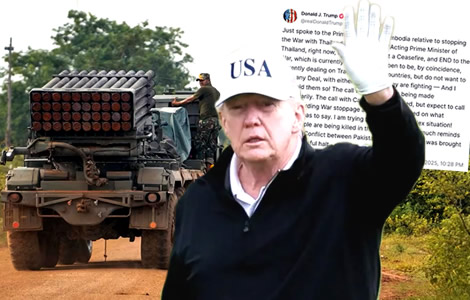Trump forces Thailand and Cambodia into ceasefire talks after deadly border clashes. Over 150,000 flee violence as Trump warns no trade deals until fighting stops. Leaders agree to negotiate peace, but clashes continue amid mounting regional tensions and a humanitarian crisis.
U.S. President Donald Trump has stepped into the Thai-Cambodian clash—and scored an early win. After late-night talks on Saturday, Cambodian Prime Minister Hun Manet and Thailand’s acting PM Phumtham Wechayachai have tentatively agreed to a ceasefire. Trump made it clear on Truth Social: no peace, no trade deal. He warned both sides that tariff talks are on ice until they stop fighting and hammer out a real agreement.

U.S. President Donald Trump announced on Saturday that the leaders of Thailand and Cambodia had agreed to hold immediate ceasefire talks. The announcement came after three days of escalating violence along the disputed border between the two nations. More than 150,000 civilians have been forced to flee their homes, and at least 33 people have been killed. The conflict marks the deadliest fighting between the two Southeast Asian neighbours in over a decade.
Trump made the announcement during a private visit to Scotland, where he is staying at his Turnberry golf resort. He said he spoke separately with Cambodian Prime Minister Hun Manet and Thailand’s acting Prime Minister Phumtham Wechayachai.
Trump announces Thailand and Cambodia leaders agree to immediate ceasefire talks amid escalating violence
According to Trump, both leaders agreed to meet “immediately” and “quickly work out a ceasefire and, ultimately, peace!” He posted a series of updates on Truth Social detailing his personal involvement in the effort. While it remains unclear how Trump became involved, his high-profile intervention has now taken centre stage in regional diplomacy.
Importantly, Trump warned both governments that the United States would suspend trade talks unless the violence stopped. He stated that he would not move forward with any trade agreements until “the fighting stops.” Earlier this month, Trump had already sent letters to both countries threatening to impose a 36% tariff on most of their exports to the U.S. beginning August 1. This looming tariff deadline added pressure, and Trump’s ultimatum appears to have pushed both parties toward negotiations.
“When all is done, and peace is at hand, I look forward to concluding our trading agreements with both!” Trump wrote. Both leaders, he said, were eager to return to the “trading table,” though no negotiations could proceed while fighting continued.
While the Thai and Cambodian embassies in Washington have not yet commented, Trump claimed that his calls had produced an immediate commitment to talks.
Meanwhile, fighting continued into a third day on Saturday. Gunfire, artillery shelling, and drone incursions were reported in multiple areas. The latest flashpoints included Trat province in Thailand and Cambodia’s Pursat province.
Fighting spreads with flashpoints over 100 kilometers from previous clashes along the Thai-Cambodian border
Notably, these locations are over 100 kilometres from earlier clashes, suggesting the violence is spreading. According to officials, at least 33 people have been killed—20 in Thailand and 13 in Cambodia. Thai authorities reported seven soldiers and 13 civilians dead. Cambodia’s Defence Ministry confirmed five soldiers and eight civilians had died.
The border dispute reignited after the death of a Cambodian soldier during a brief skirmish in late May. Since then, both sides have reinforced troop positions and moved military equipment closer to the border.
Tensions have simmered for years in the area, which includes ancient temples and lands claimed by both nations. Colonial-era borders drawn by France have long left these regions contested. In particular, the Preah Vihear Temple area has sparked multiple clashes in recent decades.
Both governments blame each other for starting the current round of hostilities. Thai officials claimed the conflict began when Cambodia deployed surveillance drones over Thai positions. Cambodia, however, accused Thai troops of crossing into disputed territory near a sacred temple. As a result, both sides insist they are acting in self-defence. Neither has announced a withdrawal of forces, even after agreeing to talks.
The border conflict grows with blame exchanged over territory and no force withdrawals despite talks
The humanitarian toll is growing rapidly. Over 150,000 civilians have evacuated towns and villages along the border. In Thailand’s Sisaket province, a university campus has been turned into an emergency shelter. According to one volunteer, more than 5,000 people are staying there.
“We got so scared with the sound of artillery,” said 51-year-old Samrong Khamduang, who fled with her children. Her husband remained behind to care for livestock. “Now we’ve lost the connection. I couldn’t call him. I don’t know what is happening back there.”
Hospitals in both countries are overwhelmed. Medical staff are treating patients with blast injuries, burns, and shrapnel wounds. Drone footage from border regions shows long lines of evacuees waiting near trucks distributing food and water.
Aid agencies have mobilised to provide shelter, medicine and clean drinking water. Nonetheless, access remains difficult due to ongoing shelling in some contested areas.
Regional diplomacy also intensified on Saturday. Malaysian Prime Minister Anwar Ibrahim, who currently chairs ASEAN, pushed for a ceasefire.
Malaysia pushes for a ceasefire amid worsening humanitarian crisis and ongoing border fighting
Cambodia supported his proposal immediately. Thailand said it agreed “in principle.” Anwar acknowledged that fighting was still ongoing. However, he instructed his foreign minister to remain in contact with both countries. “If possible, I will continue engaging with them myself—at least to halt the fighting,” Anwar said.
At the United Nations, the conflict was discussed during a Security Council meeting. Thailand’s ambassador, Cherdchai Chaivaivid, accused Cambodia of planting landmines inside Thai territory and launching unprovoked attacks. “Thailand urges Cambodia to immediately cease all hostilities and acts of aggression,” he told the council.
Cambodia’s Defence Ministry issued a statement denying the allegations. Instead, it accused Thailand of initiating the violence and mobilising forces for a broader assault. “These deliberate military preparations reveal Thailand’s intent to expand its aggression and further violate Cambodia’s sovereignty,” the ministry claimed.
Meanwhile, both militaries remain on high alert. Artillery units and tanks have reportedly been moved closer to the border. As of late Saturday night, the ceasefire agreement mentioned by Trump had not yet produced a visible reduction in hostilities.
UN debates Thai-Cambodian conflict as both sides deny accusations while militaries stay on high alert
Trump’s involvement has surprised many regional observers. Only a day earlier, Thailand’s foreign minister had dismissed the need for third-party mediation. Despite this, Trump claims his outreach was well received.
On Truth Social, he described the exchanges as “productive” and emphasised the urgency of a ceasefire. “Peace and trade—that’s what we need!” he posted.
Hun Manet responded positively, issuing a statement early Sunday morning local time. He said Cambodia supported “the proposal for an immediate and unconditional ceasefire.” He also thanked Trump and ASEAN leaders for their efforts.
Thailand’s response was more measured. Its Foreign Ministry said the government wanted to see “sincere intention from the Cambodian side.” Phumtham reportedly asked Trump to ensure Cambodia remained fully committed to a peaceful dialogue.
Despite agreeing to negotiations, neither side has publicly announced a ceasefire on the ground. Sporadic gunfire and shelling continued late on Saturday, even after diplomatic statements were released.
It remains unclear whether the talks will begin in the coming days or if fresh fighting will derail them.
Mixed responses from Thailand and Cambodia as fighting continues despite agreed talks and ceasefire
The broader context of the conflict complicates the situation. Thailand is a long-standing U.S. ally with one of the most advanced militaries in the region. Cambodia, however, maintains close military and economic ties with China.
As a result, the dispute carries regional and global implications, particularly amid heightened geopolitical tensions in Asia.
For now, Trump’s uninvited but high-profile intervention has raised hopes for de-escalation. Yet the path to peace remains uncertain. Although diplomatic statements offer a start, both sides must demonstrate restraint on the battlefield.
With lives lost, civilians displaced, and tensions mounting, the next 48 hours could prove critical.
Thai military warns Cambodia about the deployment of Chinese made long range missiles against civilians
Hot War rages on the Thai Cambodian border with Cambodian troops on the offensive in the Chong Bok area
Cambodia’s Hun Sen’s hidden agenda for unprovoked, deadly and destructive actions may involve China
If ceasefire talks proceed and hold, they may avert a wider conflict. If not, the region risks plunging into a more prolonged and destabilising war. Certainly, also, the development highlights the sluggish nature of diplomacy between both countries and world bodies.
Sources in Thailand on Saturday were critical of the Ministry of Foreign Affairs and its handling of this crisis.
In particular, the delay and lack of decisive briefings to media and world leaders from Thailand’s end. Indeed, Thai secrecy and reticence have been a hallmark of the crisis from the beginning, including the debacle of Prime Minister Paetongtarn Shinawatra’s controversial telephone call with Cambodian despot Hun Sen on June 15th last.
Join the Thai News forum, follow Thai Examiner on Facebook here
Receive all our stories as they come out on Telegram here
Follow Thai Examiner here
Further reading:
Hot War rages on the Thai Cambodian border with Cambodian troops on the offensive in Chong Bok area
14 killed and over 100,000 evacuated as army brings in more guns trained on Cambodian border forces
Military blasts Cambodia for breaching international law by planting mines which injured 3 soldiers


















